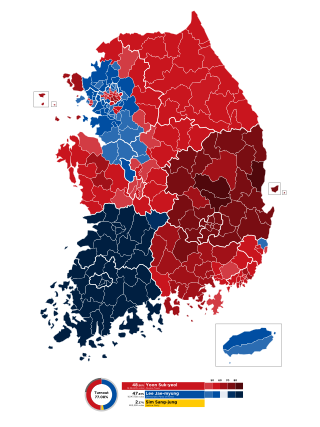Contents
This article needs additional citations for verification .(January 2017) |
| |||||
| Centuries: | |||||
|---|---|---|---|---|---|
| Decades: | |||||
| See also: | Other events of 2016 Years in South Korea Timeline of Korean history 2016 in North Korea | ||||
This article needs additional citations for verification .(January 2017) |
| |||||
| Centuries: | |||||
|---|---|---|---|---|---|
| Decades: | |||||
| See also: | Other events of 2016 Years in South Korea Timeline of Korean history 2016 in North Korea | ||||

The president of the Republic of Korea, also known as the president of Korea, is both the head of state and head of government of the Republic of Korea. The president is directly elected by the citizens of the Republic of Korea and pledges to execute the duties of their office, chief among others "to defend the State, pursue peaceful unification of the homeland." The president leads the State Council, is the chief of the executive branch of the national government and the commander-in-chief of the Republic of Korea Armed Forces.

Influence peddling, also called traffic of influence or trading in influence, is the practice of using one's influence in government or connections with authorities to obtain favours or preferential treatment for another, usually in return for payment. Influence peddling per se is not necessarily illegal, as the Organisation for Economic Co-operation and Development (OECD) has often used the modified term "undue influence peddling" to refer to illegal acts of lobbying; however, influence peddling is typically associated with corruption and may therefore delegitimise democratic politics with the general public. It is punishable as a crime in Argentina, Belgium, Bulgaria, Brazil, France, Hungary, Italy, Mexico, Portugal, Romania, Spain, and the United Kingdom.

Park Geun-hye is a South Korean politician who served as the 11th president of South Korea from 2013 to 2017. Park was the first woman to be elected president of South Korea, and also the first woman to be popularly elected as a head of state in East Asia. She is also the first South Korean president to be born after the founding of South Korea. Her father, Park Chung Hee, was president from 1963 to 1979, serving five consecutive terms after he seized power in 1961.

Sungkyunkwan Scandal is a South Korean historical drama starring Park Yoo-chun, Park Min-young, Song Joong-ki, and Yoo Ah-in. Directed by Kim Won-seok and written by Kim Tae-hee, it is based on Jung Eun-gwol's bestselling 2007 novel The Lives of Sungkyunkwan Confucian Scholars. It aired on KBS2 from August 30 to November 2, 2010 on Mondays and Tuesdays at 21:55 for 20 episodes.

Presidential elections were held in South Korea on 19 December 2012. They were the sixth presidential elections since democratization and the establishment of the Sixth Republic, and were held under a first-past-the-post system, in which there was a single round of voting and the candidate receiving the highest number of votes was elected. Under the South Korean constitution, a president is restricted to a single five-year term in office. The term of the then incumbent president Lee Myung-bak ended on 24 February 2013. According to the Korea Times, 30.7 million people voted with turnout at 75.8%. Park Geun-hye of the Saenuri party was elected the first female South Korean president with 51.6% of the vote opposed to 48.0% for her opponent Moon Jae-in. Park's share of the vote was the highest won by any candidate since the beginning of free and fair direct elections in 1987 and the first such election in which any candidate won a majority. Moreover, as of the 2022 election, this is the latest South Korean presidential election in which the winning candidate won an absolute majority of the vote.

Early presidential elections were held in South Korea on 9 May 2017 following the impeachment and removal of Park Geun-hye. The elections were conducted in a single round, on a first-past-the-post basis, and had originally been scheduled for 20 December 2017. However, they were brought forward after the decision of the Constitutional Court on 10 March 2017 to uphold the National Assembly's impeachment of Park. Following procedures set out in the Constitution of South Korea, Prime Minister Hwang Kyo-ahn succeeded Park as the acting president. After Park was removed from office by the Constitutional Court's ruling, acting president Hwang announced he would not run for a term in his own right.

The 2012 NIS public opinion manipulation scandal saw members of the National Intelligence Service (NIS) of South Korea accused of interfering in the South Korean presidential election, 2012. First, an agent of the National Intelligence Service (NIS) was alleged to have manipulated public opinion to help Park Geun-hye's presidential election under the command of the NIS. Second, the director of the agency commanded an NIS agent to manipulate public opinion. Suspicions were raised before the election, but were not verified until afterwards.
The following lists events that happened in 2015 in South Korea.

Hwang Kyo-ahn is a South Korean politician and prosecutor who served as acting president of South Korea from 9 December 2016 to 10 May 2017 and the prime minister of South Korea from 18 June 2015 to 11 May 2017.

Chung Yoo-ra, birth name Chung Yoo-yeon(정유연), is a South Korean equestrian. She competed in the 2014 Asian Games, where her team won a gold medal.

Choi Soon-sil is a South Korean businesswoman known primarily for her involvement in the 2016 South Korean political scandal, stemming from her influence over the 11th President of South Korea, Park Geun-hye. In 2018, a court sentenced Choi to 20 years in prison on corruption charges. Due to Choi's concurrent involvement in her father's religious cult, reporting media have called her "South Korea's Rasputin", in reference to Russian mystic Grigori Rasputin.
Choi Tae-min was the leader of the Church of Eternal Life, a South Korean cult combining elements of Buddhism, Christianity, and traditional Korean Shamanism. Choi, originally a Buddhist monk, then a convert to Presbyterian pastor, was married six times. He was the mentor of the impeached South Korean president, Park Geun-hye, until his death in 1994. He allegedly used his relationship with Park to solicit bribes from government officials and businessmen. In late 2016, a scandal involving his daughter, Choi Soon-sil, broke out, with allegations that she too has exerted undue influence over President Park.

Ko Young-tae is a South Korean businessman and fencer. He competed in the individual and team sabre events at the 1998 Asian Games.

The 2016 South Korean political scandal, often called Park Geun-hye–Choi Soon-sil Gate in South Korea, was a scandal that emerged around October 2016 in relation to the unusual access that Choi Soon-sil, the daughter of shaman-esque cult leader Choi Tae-min, had to President Park Geun-hye of South Korea.

The 2016–2017 South Korean protests were a series of protests against President Park Geun-hye that occurred throughout South Korea from November 2016 to March 2017. Protesters denounced the Park administration's 2016 political scandal and called for the resignation of Park Geun-hye.

On 9 December 2016, Park Geun-hye, the president of South Korea, was impeached as the culmination of a political scandal involving interventions to the presidency from her aide, Choi Soon-sil. 234 members of the 300-member National Assembly voted to impeach and temporarily suspend Park's presidential powers and duties. This exceeded the required two-thirds threshold in the National Assembly and, although the vote was by secret ballot, the results indicated that more than half of the 128 lawmakers in Park's party Saenuri had supported her impeachment. Thus, Hwang Kyo-ahn, then Prime Minister of South Korea, became acting president while the Constitutional Court of Korea was due to determine whether to accept the impeachment. The court upheld the impeachment in a unanimous 8–0 decision on 10 March 2017, removing Park from office. The regularly scheduled presidential election was advanced to 9 May 2017, and Moon Jae-in, former leader of the Democratic Party, who Park had narrowly defeated in the 2012 presidential election, was elected as Park's permanent successor.
Events in the year 2017 in South Korea.

Presidential elections were held in South Korea on 9 March 2022. Under the South Korean constitution, presidents are restricted to a single five-year term, meaning that incumbent president Moon Jae-in was ineligible to run for a second term. Opposition candidate Yoon Suk Yeol of the People Power Party won the election, defeating candidate Lee Jae-myung of the incumbent Democratic Party.

Get together! Get angry! #Resign_ParkGeun-hye candlelight vigil was the first candlelight vigil held on October 29, 2016, to demand resignation of President Park Geun-hye. This was a vigil that opened the prelude to a total of 20 candlelight vigils, with 30,000 citizens estimated by organizers calling for the resignation of President Park.